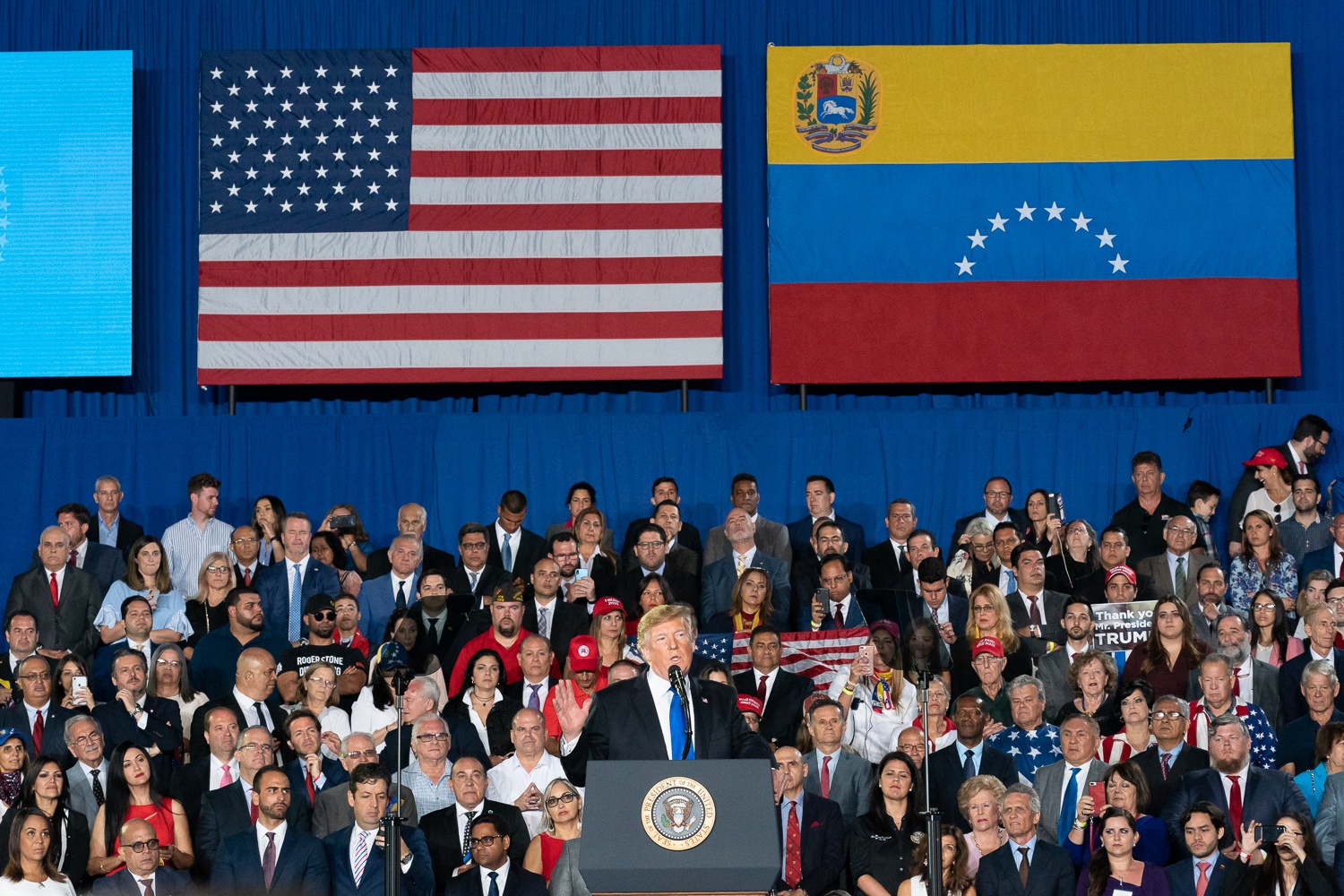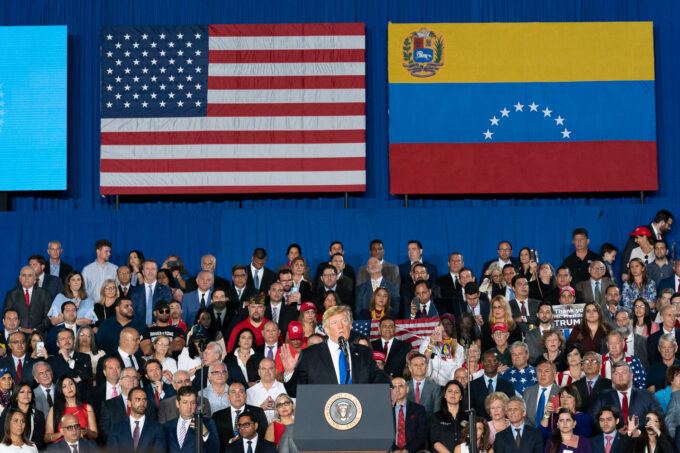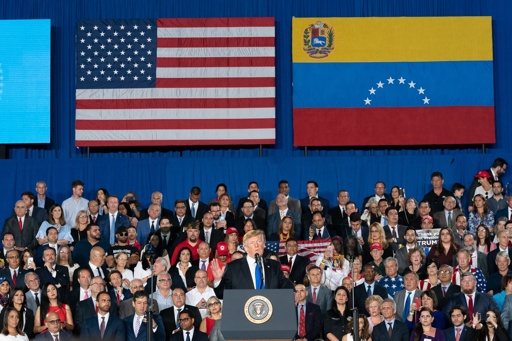

Photograph Source: The White House – Public Domain
On November 16, 2025, a rather vacuous yet incendiary op-ed titled “Venezuelans might not mind an American invasion” appeared in the Boston Globe suggesting that Venezuelans would welcome an invasion by the US military. Supposedly, the writer Antonio Matheus lives in Venezuela. He repeated the current talking points it seems necessary to repeat in every article that refers to Venezuela in the western media. We know what they are: terrible repression, the worst economy ever, authoritarian…and so on. Of course, the writer did not mention the effect the US sanctions have had on the economy. Nor did he mention that those sanctions are constructed so that any nation who trades with Venezuela will also be punished. His essay also did not include the fact that the US is holding the receipts from the sales of Venezuelan oil products hostage. But enough of this repetition of the same falsehoods and half-truths we have been hearing since Hugo Chavez was elected President of Venezuela in 1998.
To be clear, I am not trying to gloss over the shortcomings of the current government in Caracas. It certainly has its issues that it should be left in peace to work on resolving. However, it is important to consider that like any government under attack from a more powerful government intent on removing it, certain restrictions have been enacted. Like any economy being strangled by a more powerful economic power—in fact one of the world’s two most powerful economies—Venezuela’s economy has suffered. As for the accusations of the government involvement in drug trafficking: even the US Drug Enforcement Agency (DEA) does not consider the Maduro government to be involved in drug trafficking. The aforementioned op-ed writer dismisses the charges as irrelevant. At least he has the honesty to admit that the US military buildup in the Caribbean has very little to do with drugs and a lot to do with Washington’s decades long desire to put a client regime back in power in Caracas.
The most appalling aspect of the op-ed is that the writer, who claims Venezuelan citizenship, seems okay with the idea of a US invasion of the country he lives in. Another Venezuelan who is on record making a similar statement is Maria Corina Machado, the failed right-wing candidate for Venezuelan president and winner of the misnamed (in this instance) Nobel Peace Prize. Her exuberance for a US-sponsored coup in Venezuela is backed up by her involvement in at least one of the two or three coup attempts Washington has been involved in since 2000. To her credit, she is clear about why she supports a coup; she wants the Venezuelan comprador class back in power, just like they were most of the century before Chavez’s Bolivarian revolution was elected into power. If I were calling for a foreign invasion of the United States, I would be committing treason. The expressed desire of both of the Venezuelans for a US invasion is treason, plain and simple. To publish a piece that essentially calls for such an act says more about the nature of empire than ten thousand words could; about how it corrupts the soul of the imperial nation and turns its supposedly free press into its tool, its mouthpiece.
Speaking of Machado, my disgust with the Globe op-ed was doubled when I looked at the Washington Post the following day, November 18, 2025. The pro-invasion propaganda has stepped up its game, with the Post editorial board touting a new “freedom manifesto” from Maria Corina Machado—the current champion of the Venezuelan right and most of the US government, no matter which party they belong to. The propaganda is directed at the US public, not Venezuelans. In its editorial, the Post board writes that her manifesto “links political freedom with economic prosperity. To reawaken the economy, she proposes privatizing state-owned enterprises and “restoring the development of our oil and gas sectors to the ingenuity of free men and women.” Instead of “unduly interfering,” she wants the government to “provide the conditions to create a free and competitive economy.” It follows these words with the affirmation, “Amen to all that.” In other words, she wants the same class of compradors who turned over Venezuelan energy resources to US companies last century to do the same thing in this one. She cries out against interference in the economy, but, like her cohort writing in the Globe, completely ignores the entity whose interference in the Venezuelan economy is one of the main reasons for the current economic situation. That would be the United States government and its sanctions, not the redistribution of oil wealth among the laboring classes and indigenous. Near the end of its sycophantic exercise in convincing its readers, the Washington Post equates democracy with “energy security in the western hemisphere.” Translated, this means a constant source of fossil fuels for the gringo country to the north and the profits that come with it. History makes it clear: the procurement of fossil fuels for US consumption and sales has nothing to do with freedom or democracy. In fact, it usually means the opposite for the people in the lands where those resources lie.
Both the Boston Globe and the Washington Post have a reputation of being liberal newspapers. I’ve been reading both since the late 1960s; historically the Globe’s reputation as such is considerably more valid than the Post’s. This isn’t meant to disparage either outlet’s important reporting, especially in the past (Watergate, Pentagon Papers, Church pedophile coverups). The Washington Post has often cheered on potential invasions by US forces and supported the expansion of Washington’s wars; the Globe not so much. That tradition continues. After all, it was a guest writer who wrote the thoughtless piece in the Globe while it was the Post’s editorial board that wrote the propaganda there. Indeed, since Jeff Bezos bought Washington Post, its coverage has suffered and its editorial staff has gone even further to the right. I think one of the writers in the comment section for the Post editorial said it best when they called the editorial an “amateurish, clumsy piece of propaganda. (that) Reads like a WWII news report.”
As I write this, newspapers are reporting that President Trump might negotiate with President Maduro. While hopeful, I am even more skeptical that any such talks would be anything but a feint, a pretense at hope for the Venezuelans that don’t want an invasion of their lands. The Bushes did something similar before they invaded Iraq, Clinton did something similar before he bombed the former Yugoslavia and Trump did so before he bombed Iran.
The potential invasion of Venezuela and even the presence of the US military off its shores is little more than gunboat diplomacy at its worst. The fact that the Globe and the Washington Post would publish editorials essentially supporting an invasion is little more than the twenty-first century version of Randolph Hearst’s warmongering headline in 1898 to Remember the Maine! To Hell With Spain! There should be no place for it in the modern world. Yet here we are.
The post Stepping Up the Propaganda for War appeared first on CounterPunch.org.
From CounterPunch.org via this RSS feed


